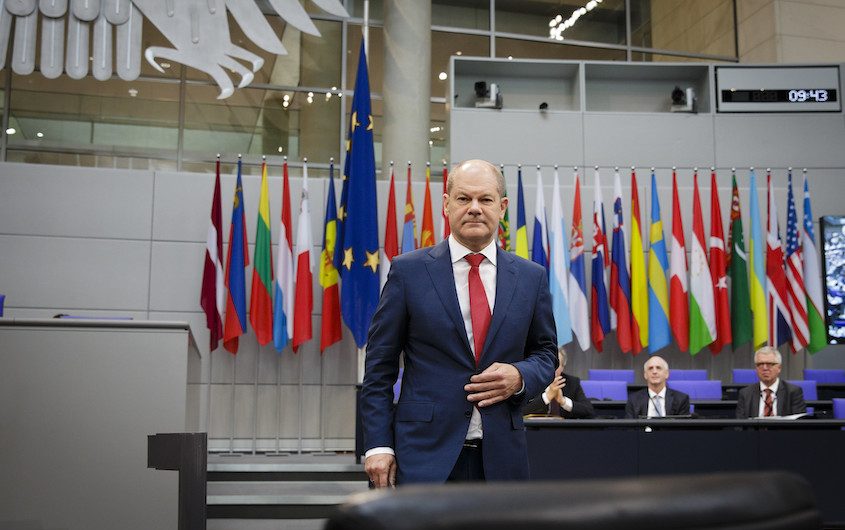
OSCE Parliamentary Assembly via Flickr
German Strategic Culture

Alexander Privitera
AGI Non-Resident Senior Fellow
Alexander Privitera a Geoeconomics Non-Resident Senior Fellow at AGI. He is a columnist at BRINK news and professor at Marconi University. He was previously Senior Policy Advisor at the European Banking Federation and was the head of European affairs at Commerzbank AG. He focuses primarily on Germany’s European policies and their impact on relations between the United States and Europe. Previously, Mr. Privitera was the Washington-based correspondent for the leading German news channel, N24. As a journalist, over the past two decades he has been posted to Berlin, Bonn, Brussels, and Rome. Mr. Privitera was born in Rome, Italy, and holds a degree in Political Science (International Relations and Economics) from La Sapienza University in Rome.
Small Steps or Side-Stepping?
Two years after Russia’s invasion of Ukraine, German chancellor Olaf Scholz is still in search of the right balance between courage and prudence in addressing the biggest threat to European security since the start of the new millennium. His cautious leadership style is increasingly ill-suited to solving the challenges he is facing, from the war in the East to the erosion of Germany’s socio-economic success model. At home, his approval ratings have collapsed. Abroad, many European partners are growing frustrated.
But Scholz’s preference for incrementalism is nothing new. Not long ago the politics of small steps was the signature leadership style of Chancellor Angela Merkel. Incrementalism has a long tradition in postwar Germany. Konrad Adenauer famously promised “no experiments.” One of his successors, Helmut Schmidt, explained the method as follows: “(…) step by step reforms of the economy, society, and state institutions suit our democracies the best. Bold changes bear the danger of jeopardizing citizens’ freedoms, because, in case of failure, corrections can only be undertaken by causing even greater sacrifices than is the case when a much smaller step is pursued—finally, I may add—because a parliamentary system in a complex industrial democracy is simply not fit for disruptive changes.”[1] Indeed, one of Schmidt’s successors, Gerhard Schröder, paid a high price for forcing greater course corrections on his citizens at the turn of the century. He lost power shortly after introducing bold reforms aimed at addressing the German economy’s loss of competitiveness. His political fate provided a cautionary tale for future chancellors.
Much of Germany’s postwar success story rests on its leaders’ ability to ensure political stability and minimize socioeconomic strife. In the German context, the constant tension between stability and change is usually successfully resolved when leaders manage to wrap the latter in the reassuring cloak of inevitability. When, during the euro crisis, Merkel famously affirmed “if the euro fails, Europe fails,” she was defending new European policies to make them appear alternativlos—without an alternative. But German incrementalism has been most effective when the direction of travel was clear. Pursuing a long-term strategy prudently is one thing, quite another to use small steps as a tactical tool used to avoid difficult choices.
With the war threatening Europe’s entire model for peace and security—and possibly even the very existence of a democratic European Union—current German leaders should also ask themselves if they are sufficiently addressing a more fundamental question, one posed by historian Michael Stürmer shortly after German reunification: “[…Would] Germans, for four decades the ideal students in the transatlantic and European classroom, … continue to be such? In the past they had no choice. In the future they will have to decide themselves.”[2]
The chancellor of German reunification Helmut Kohl answered unequivocally by pursuing closer political integration, even after taking the decision to create a common currency, the euro. In his view “We will make no progress towards political union if the question of common defense is not included. The political union is just as necessary as the economic and currency union.” By overemphasizing economic matters, Kohl’s successors Schröder and Merkel have been much more ambivalent about pursuing those larger, European goals. Where does Scholz stand?
Looking for an answer inevitably leads to France. Once hailed as the engine of the European Union, the Franco-German partnership has become a pale copy of its former self. Pursuing common strategies is now the exception rather than the rule. It is almost a habit in Berlin to flippantly dismiss new French ideas as ‘Gaullist’ attempts to shackle Germany to Parisian ambitions for predominance in the Union. The French retort is equally unflattering, typically accusing Berlin of offering political roadblocks rather than solutions.
Pursuing a long-term strategy prudently is one thing, quite another to use small steps as a tactical tool used to avoid difficult choices.
This mutual frustration masks a paradox. In the previous decade, while France has gradually recognized and reluctantly accepted the limits to its national power within the European context, Germany has increasingly embraced a stronger role for nation-states in the EU. Ironically, by embracing the intergovernmental method, it is Germany that has adopted a more Gaullist stance on the European stage. Characteristically, this has been the result of many small steps rather than the outcome of a dramatic pivot.
Thus, Scholz’s inability to see eye to eye with his French partner is also the legacy of Merkel’s attitude towards Europe and France. Merkel had managed to tilt the balance between Berlin and Paris in her favor, first by taming the frantically hyperactive French president Nicholas Sarkozy, then the ideologically distant socialist Francois Hollande. She only found her true match in Macron, who convinced her to respond to the COVID-19 pandemic with new common European funds, something she had previously resisted in response to the euro crisis. Scholz fears Macron could outshine him.
Without greater balance between Paris and Berlin, Europe immediately becomes dysfunctional. The resulting temptation to resort to national assertiveness is in fact self-defeating. It usually triggers pushback from partners and leads to public acrimony in the bloc. Nobody in Europe is willing to be led by a single country, neither by Germany nor France, and certainly not by Russia. Any attempt to dominate the bloc, the reason for centuries of armed conflict on the continent, would hardly be the answer to the Russian aggression against Ukraine. They would prove Putin right in his belief that the European Union is a chimera, an artificial construct that can be undermined from within simply by reawakening nationalism in its member states.
Scholz seems to understand this. He has resisted repeated calls from within his country to demonstrate stronger leadership in Europe. He recently reminded the Bundestag that Germany remains a “Mittelmacht,” a medium-sized power unable—and unwilling—to take unilateral steps. Scholz has only moved on delivering sophisticated weaponry to Ukraine when he had the backing of the U.S. administration. But once Washington’s ability to act was hijacked by its own domestic politics, Scholz could no longer hide behind the United States. To his critics, the chancellor’s prudence has become synonymous with passivity.
Indeed, Scholz still owes Germans a clarification: whether his incrementalism is in pursuit of a long-term goal or merely an attempt to avoid making fundamental choices. Is his self-restraint purposeful and part of a broader European strategy to be pursued with his partners? Or is it the result of a mix of angst, risk aversion, and short-term self-interest, resulting in a wait-and-see approach and the hope that perhaps the status quo ante will return? The answer to this question will tell us much about how successfully Germany and Europe can overcome the current crisis, it will clarify whether the continent can address the Russian threat even with less support from Washington.
[1] Helmut Schmidt, Weggefährten: Erinnerungen und Reflexionen (Berlin: Siedler, 1996), p. 122.
[2] Michael Stürmer, Die Grenzen der Macht (Berlin: Siedler, 1992), p. 8.









